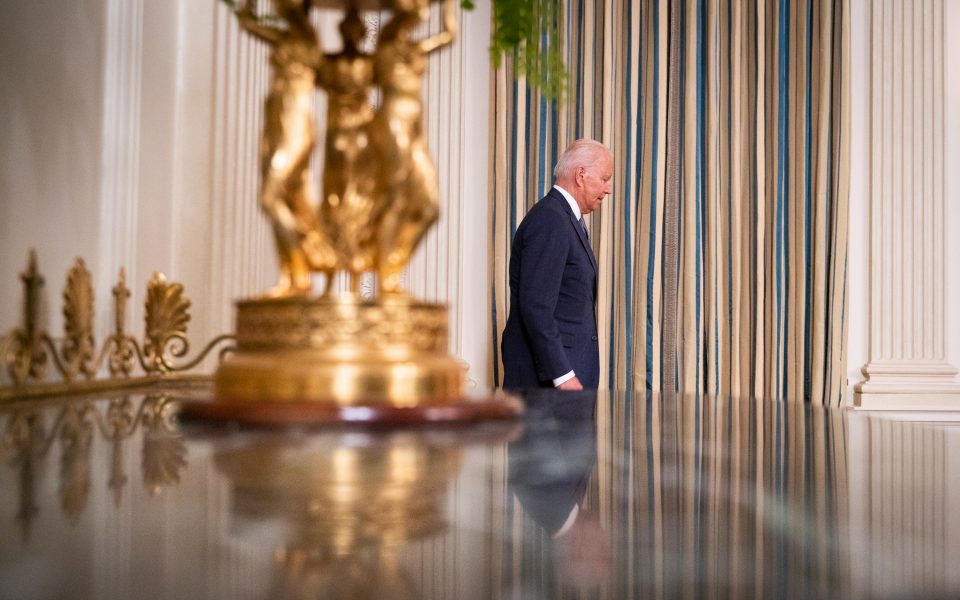Biden urges more scrutiny of big businesses, such as tech giants

President Joe Biden signed a sweeping executive order on Friday intended to increase competition within the nation’s economy and to limit corporate dominance, factors the White House says have led to higher prices and fewer choices for consumers while dampening pay and restricting the freedom to change jobs.
The administration encouraged federal agencies to take a wide range of actions, such as more closely scrutinizing the tech industry, cracking down on high fees charged by ocean shippers and allowing hearing aids to be sold over the counter.
“What we’ve seen over the past few decades is less competition and more concentration that holds our economy back,” Biden said in the White House on Friday, citing the agriculture, technology and pharmaceutical industries. “Rather than competing for consumers, they are consuming their competitors. Rather than competing for workers, they’re finding ways to gain the upper hand on labor.”
The order reflects the administration’s growing embrace of warnings by some economists that declining competition is hobbling the economy’s vitality. Progressive groups celebrated it, while some business groups criticized it harshly.
But Biden may find it difficult to address the decline in competition across diverse parts of the economy — including Silicon Valley, Wall Street, chain restaurants and large hospital networks — solely through executive action. Experts warn that in many areas, Biden will need to work with Congress to change federal laws if he hopes to have more success than former President Donald Trump, who also issued competition-focused executive orders and who saw limited results from them.
Many of the agencies, such as the Federal Trade Commission and the Federal Communications Commission, that were mentioned in the Friday order are independent, meaning the White House can only encourage them, not direct them, to take specific steps. But in statements Friday, those agencies largely embraced the proposals and promised to take action.
In interviews this week, senior administration officials acknowledged the limitations of executive authority but said the order focused on actions, such as directing federal regulators to take steps to boost competition, that had the best chance of success in driving change across the economy.
The order includes 72 provisions stretching across disparate sectors of the economy. One part of the order tells the federal agencies that approve mergers that they should update their guidance for vetting deals to better capture technology companies’ business models. Another asks the FCC to reinstate so-called net-neutrality rules for broadband providers. Yet another asks the FTC to stop manufacturers from blocking farmers from repairing their tractors on their own.
Other parts target health care at several levels. The order supports states and tribal governments that allow the importing lower-cost prescription drugs from Canada, pushes to allow hearing aides to be sold over the counter and asks the FTC and the Justice Department to more stringently scrutinize hospital mergers to ensure that patients are not harmed by them.
Another focus are the companies that move people and goods around the world. The order encourages new rules governing airline fees, for example. The airline industry consolidated substantially in the 2000s and early 2010s, with a series of mergers and acquisitions creating four large carriers that now serve almost two-thirds of all American passengers. The order also asks the Federal Maritime Commission, an independent agency, to aggressively enforce law against companies that charge exporters high prices to transport their products by sea.
The order has numerous parts that the White House says will benefit workers. It encourages the FTC to ban or limit noncompete agreements, which employers have increasingly used in recent years to try to inhibit their workers’ ability to quit for better jobs. It encourages the commission to ban “unnecessary” occupational licensing restrictions, which can restrict workers’ ability to find new work, especially across state lines. And it encourages both the commission and the Justice Department to further restrict the ability of employers to share information on worker pay in ways that might amount to collusion.
More broadly, the executive order encourages antitrust regulators to consider the ways that mergers might contribute to monopsonies — industries in which workers have few choices of where to work and therefore lack leverage to negotiate higher wages or better benefits.
The White House Council of Economic Advisers noted several examples of such industries in an accompanying research brief Friday, including beef packing and airlines, which are each dominated by four large companies.
The order will create a White House Competition Council, led by Brian Deese, director of the National Economic Council, which will “coordinate the federal government’s response to the rising power of large corporations in the economy,” administration officials said in a statement.
FTC Chair Lina Khan and Richard Powers, acting assistant attorney general for antitrust, said that their agencies would review the current guidelines “with the goal of updating them to reflect a rigorous” approach toward mergers.
“We must ensure that the merger guidelines reflect current economic realities and empirical learning and that they guide enforcers to review mergers with the skepticism the law demands,” the two said in a statement.
In a separate statement, Attorney General Merrick Garland said the Justice Department would work closely on competition questions with officials in other government agencies. That could include weighing in on mergers being vetted by other agencies, which can consider deals using standards that are not related to whether a transaction will decrease competition.
The order is a victory for progressive lawmakers and academics who say government regulators failed to check corporate America for decades, instead aligning themselves with a conservative view that set a high standard for when the government should block mergers or break up monopolies. They have also criticized the Obama administration for failing to properly police industry consolidation, particularly in Silicon Valley.
They say that policymakers need to aggressively enforce antitrust laws and possibly rewrite them entirely. Without drastic action, they argue, consumers will have less choice, suppliers of bigger companies will get squeezed and giant corporations will only grow larger.
David Segal, executive director of the group Demand Progress, said in a statement that the order represented “a wish list progressives and other pro-competition advocates have been promoting for years, and in some cases, decades.”
A leading business lobbying group in Washington, the U.S. Chamber of Commerce, panned the order. Neil Bradley, the group’s chief policy officer, said the order was “built on the flawed belief that our economy is overconcentrated, stagnant and fails to generate private investment needed to spur innovation. Such broadsided claims are out of touch with reality, as our economy has proven to be resilient and remains the envy of the world.”
Biden has put some vocal critics of corporate power in leadership positions. In the White House, he appointed Tim Wu, a Columbia University law professor and an outspoken proponent of breaking up companies such as Facebook, as a special adviser on competition. To lead the FTC, he tapped Khan, who worked on a House antitrust investigation into Amazon, Apple, Facebook and Google, and earlier in her career wrote critically about concentration in other industries, including candy manufacturing and agriculture.
But Biden has also not yet nominated someone to lead the Justice Department’s antitrust division, a key position in determining the administration’s position on competition issues.
Federal courts have also taken a conservative approach to antitrust law in recent decades, underscoring how difficult it may be for the order to have any lasting effect. Last month, a judge threw out an lawsuit from the FTC that argued Facebook had violated antitrust laws in buying smaller competitors Instagram and WhatsApp. The judge gave the agency 30 days to refile the case.
William Baer, who led the antitrust division of the Justice Department during the Obama administration, said courts often gave “careful consideration” to the guidance on mergers that the executive order sought to update. But he noted that as the courts became more conservative on antitrust questions generally, they were more likely to reject challenges to deals.
“There’s a headwind there that may or may not be overcome,” he said.
House lawmakers have advanced a handful of proposals to strengthen the agencies’ hands when it comes to Big Tech, but those bills are expected to face fierce resistance. Many of the measures in the executive order don’t necessarily need an act of Congress to broaden the agencies’ abilities. In many cases, regulators have held back on enforcing existing laws and creating new rules, people familiar with the White House’s thinking said.
One target of the executive order is mergers where big tech companies buy small businesses with the potential to become fierce competitors, snuffing out rivals before they get off the ground. The directives encourage the agencies to revisit the guidelines to assess proposed deals, including when a company is buying a young competitor or a major cache of data that could help it dominate.
The order asks the FCC to adopt new restrictions on the practices of broadband internet providers such as Comcast, AT&T and Verizon. Activists have long said consumers have too few choices, and pay too much money, for internet service.
The order also encourages the agency to reinstitute net-neutrality rules that barred internet providers from blocking certain content, slowing down its delivery or letting clients pay more to have their content delivered faster. The agency adopted the rules during the Obama administration and then rolled them back under Trump.
Baer said that while the Obama administration had begun to focus on competition policy in its waning days, Biden had the runway to make it a major priority.
“He has the time to see it through,” said Baer.
[This article originally appeared in The New York Times.]






